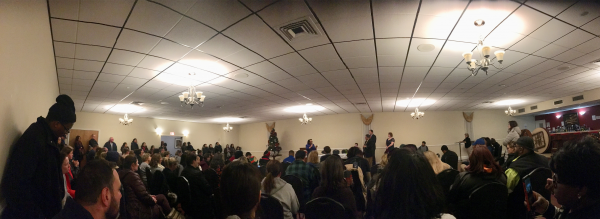December 21, 2017

A full meeting at the McKeon Post in Neponset wrestled with BPS changes to bell times for nearly three hours. Jennifer Smith photo
Pushback to proposed changes to Boston Public School start times consumed a series of well-attended meetings across the city this week, as school community members fretted about potentially excruciating social and financial disruption for some of the district’s most vulnerable families and students.
The school department is weathering scathing responses to a plan approved by the School Committee in early December. Through the proposal, created in partnership with MIT, phased start times would be adjusted across the district, generally trying to start high schools later and dismissing elementary schools earlier.
Critics maintain the process was opaque and failed to account for the human logistical complications of altering bell times.
“This entire couple of weeks has been a rollercoaster ride in how this was brought upon us [out of] left field, and how now we’re all in this disarray trying to figure out how we’re going to to live our lives,” Jovani Fox said at a public meeting Wednesday. As a single parent with a 5-year-old daughter at the Lee Academy Pilot School, she has to pay for before- and after-school care as it is, she said, and shifting the 9:30 a.m. start to 7:15 a.m. is “way too early.”
Her daughter would need to be awake at 5 a.m., Fox said, and the new dismissal time at 1:15 p.m. means she would have to pay for after-school programming until 6 p.m.
“In this day and age, with Massachusetts being one of the most expensive states to live in, there’s no such thing as being at home and not doing anything,” she said. The new times are “pitting people against our livelihoods,” she said.
Ten public meetings, concluding Thursday night, were convened to bring in community members to offer feedback on the new policy. Superintendent Tommy Chang said the start time implementation is being put on hold until the department can review feedback and make a determination around the Jan. 10 School Committee meeting.
The Henderson Inclusion School was heavily represented at a nearly three-hour meeting at the McKeon Post in Neponset on Wednesday night. This K-12 Dorchester school is facing a start time adjustment from their desirable 8:30 a.m. to 7:15 a.m., a move parents said seriously undermines the special needs students who rely upon it.
Roughly 42 percent of the Henderson’s 852 students have special needs, and 80 percent of those are considered “high need.”
Parents described how they “fought for our seat at the Henderson.” A mother said, for her son, “it was the only place I thought he would succeed.”
Visibly shaken, she echoed others who felt the school was “overlooked, and said "the thought of our environment changing, that terrifies me, because we don’t have another choice.”
School officials told attendees the thinking for the earlier Henderson start time was inspired in part by turnaround schools that did well with an earlier start. It served as an odd parallel to discussion the night before in Mattapan, where Mildred Avenue K-8 teachers and parents decried the two-hour jump in the other direction from 7:30 a.m. to 9:30 a.m. for their Level 1 school.
Carolyn Cain, chair of the Special Education Parent Advisory Council (SpedPAC) and mother to a 9th grade daughter with significant disabilities at the Henderson, said the decision to move high schoolers to 7:15 a.m. “flies in the face of logic. It doesn’t make any sense.” She added, “there’s no way that our children can survive the impact that the school district is trying to implement.”
School officials said they believed earlier times would be better for special needs and younger students because the earlier buses were more reliable.
John Hanlon, chief of operations for Boston Public Schools, said the redesigned bell times “isn’t strictly a cost issue,” though Boston does have the most expensive school transportation system in the country. Cost estimates cited at the meeting were between $5 and $10 million with the new bus routes and times.
Another topic reliably raised at the meetings: the cost of busing charter and parochial students, and whether they get to pick preferred times. The state requires that BPS handle charter school transportation and work with them on times, Hanlon said, adding that about 65 percent of charter school start before 8 a.m. and many let drop offs take place before or around 7:30 a.m. to free up buses for public school students.
With so many showing up in force — reliably around 100 people at each public meeting through the week — parents cautioned school officials that “this wasn’t going to go away.” Give them time to offer input into the new bell times before the next school year, they asked, because they suddenly need to consider their jobs, their work hours, and their neighborhoods based on these changes.
“I think that everybody’s here because we love here we live,” one mother said, barely whispering into the microphone, “and if people start leaving, that deteriorates the community.”
Topics:


